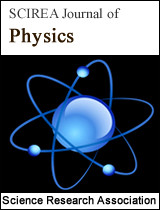Combining State Gap from Optical Dichroism of Diffuse Vibronic Spectra
DOI: 186 Downloads 12692 Views
Author(s)
Abstract
Abstract: Quantum-mechanical microscopic reversibility of vibronic transitions and Boltzmann thermal distribution of the initial (starting) states substantiate method to obtain pure-electronic transition frequency from diffuse absorption or emission spectra. It is shown, that the information is obtainable immediately from linear and circular dichroism spectra or ratio of polarization spectra when the spectra present non-identical ensembles of chromophores. The examples to obtain pure-electronic gap from experimental spectra of linear or circular dichroism are given. The approach allows selecting molecular chromophor ensembles by polarization and evaluating their combining states zero-gap.
Keywords
Keywords: Linear Dichroism, Dissymmetry Factor, Combining States Zero-gap, Chirooptics, Magnetic Optical Activity, Chromophore Polymorphism
Cite this paper
Vitaly Antonovich Tolkachev,
Combining State Gap from Optical Dichroism of Diffuse Vibronic Spectra
, SCIREA Journal of Physics.
Volume 5, Issue 4, August 2020 | PP. 69-79.
References
| [ 1 ] | V. A. Tolkachev (2017). Determination of 0-0-transition frequencies from diffuse vibronic spectra. Journal of Applied Spectroscopy 84, 668-673. |
| [ 2 ] | V. A. Tolkachev (2017). Position of 0-0-transition frequency in diffuse vibronic spectrum. Doklady Natsyonal’noi Akademii Nauk Belarusi 61, 50-55 (rus.) |
| [ 3 ] | V. A. Tolkachev (2018). Average Energies of Combining States and Purely Electronic Transition Frequencies in Vibronic Spectra. Journal of Applied Spectroscopy 85, 845-849. |
| [ 4 ] | V. A. Tolkachev (2018). Manifestation of Molecular Chromophor Polymorphism in Diffuse Vibronic Spectra. Journal of Applied Spectroscopy 85, 220-224. |
| [ 5 ] | V. A. Tolkachev (2019). Zero-phonon Transition Frequency in Diffuse Electronic Spectra of Color Centers in Crystals and Glasses. Journal of Applied Spectroscopy 86, 504-507. |
| [ 6 ] | V. A. Tolkachev and A. P. Blokhin (2019). Extraction of Pure-electronic Transition Frequency and Chromophor Polymorphism from Diffuse Vibronic Spectra. Science Journal of Analytical Chemistry 7, 76-82. |
| [ 7 ] | V. A. Tolkachev (2020). Determining the Frequency of a Purely Electronic Transition from Optical Activity Spectra. Journal of Applied Spectroscopy 87, 525-530. |
| [ 8 ] | V. A. Tolkachev (2020). A remark on Determining the Frequency of a Purely Electronic Transition from Diffuse Absorption or Emission Spectra at Low Temperature. Journal of Applied Spectroscopy 87(6), (in print). |
| [ 9 ] | Y. Li, G. He, X. Wang, Q. Guo, Y. Niu and A. Xia (2016). A Study of Excitation/Delocalization/Localization in Multibranched Chromophor by Using Fluorescence Excitation Anisotropy Spectroscopy. ChemPhysChem. 17, 406-411. |
| [ 10 ] | A. Holmen, A. Broo, B. Albinsson, B. Norden (1997). Assignment of Electronic Transition Moment Direction of Adenine from Linear Dichroism Measurements. J. Amer. Chem. Soc. 119, 12240-12250. |
| [ 11 ] | M. Tanaka and J. Tanaka (1971). Electronic Absorption Spectra of Crystals of Thymine, Uracil, and Their Derivatives. Bull. of the Chem. Soc. of Japan 44, 938-944. |
| [ 12 ] | W. C. Brunner and M. F. Maestre (1975). Circular Dichroism of Some Mononucleotides. Biopolymers 14, 555-565. |
| [ 13 ] | M. Gon, Y. Morisaki and Y. Chujo (2017). Optically Active Phenylethene Dimers Based on Planar Chiral Tetrasabstituted [2.2]Paracyclophane. Chem. Eur. J. 23, 6323-6329; SI: doi: 10.1002/chem.201605598. |
| [ 14 ] | Y. Morisaki, K. Inoshita and Y. Chujo (2014). Planar-Chiral Through-Space Conjugated Oligomers: Synthesis and Characterization of Chirooptical Properties. Chem. Eur. J. 20, 8386-8390. |
| [ 15 ] | H. Tanaka, Y. Inoue and T. Mori (2018). Circularly Polarized Luminescence and Circular Dichroism in Small Organic Molecules: Correlation between Excitation and Emission Dissymmetry Factors. ChemPhotoChem. 2, 386-402. |
| [ 16 ] | W. Voelter, G. Barth, R, Records, E. Bunnenberg and C. Djerassi (1969). Magnetic Circular Dichroism Studies. VIII. Investigations of Some Purine Cyclonucleosides. J. Amer. Chem. Soc. 91, 6165-6172. |
| [ 17 ] | B. Norden, R. Hakansson, P. B. Pedersen and E. W. Thulstrup (1978). The Magnetic Circular Dichroism of Five-membered Ring Heterocycles. Chem. Phys. 33, 355-366. |

